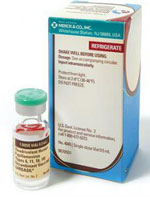When the Centers for Disease Control and Prevention (CDC) looked into the reasons behind low uptake of GlaxoSmithKline's ($GSK) and Merck's ($MRK) human papillomavirus (HPV) vaccines last year, the effect of parental attitudes to sex grabbed the headlines. Yet while parents may fear the vaccine will lead to risky sex, all the evidence suggests otherwise.
 |
| Merck's Gardasil HPV vaccine--FierceBiotech file photo |
This week the body of evidence to ease parents' fears about Merck's Gardasil and GSK's Cervarix grew still more compelling. Writing in the journal Pediatrics, National Institutes of Health-funded researchers report that most young women who receive a HPV vaccine understand it is still necessary to practice safe sex. The researchers reached the conclusion by surveying 339 young women aged 13 to 21 years old who were getting their first HPV vaccine.
A minority of the surveyed women misunderstood the effect of vaccination on the risk of catching sexually transmitted infections (STI), but they didn't become more promiscuous as a result. "To me, the issue is laid to rest. As clinicians and researchers, we have no concerns that vaccination will lead to riskier sexual behaviors," Cincinnati Children's Hospital Medical Center's Dr. Jessica Kahn told Reuters.
The latest data comes 16 months after another study found girls who receive a HPV shot are no more likely to catch a STI or become pregnant than their unvaccinated peers. Collectively, the studies suggest other factors--such as a person's family--have more effect than HPV vaccines. "There are so many contributing factors to whether an adolescent decides to have sex or not, and whether they decide to limit their number of partners or use condoms. Getting a vaccine probably just plays a very, very small role in their decisions," Khan said.
- here's the Reuters article
- read the research abstract